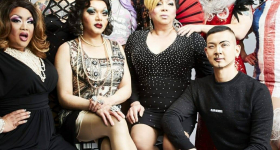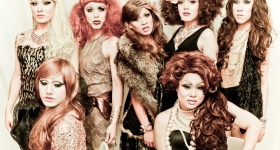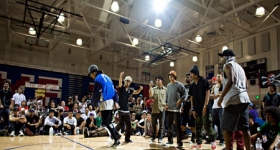I want to frame this conversation with how you feel this play fits in to a larger conversation. Where do you see this play within the scope of Asian American theater? Do you think it counts as Asian American theater, seeing as it does not explicitly address Asian American issues? And does it even matter?
As
I move through the world, what
stories and issues I engage with will vary. This play has to do with
what is
engaging me right now: the state of America, the contradictions, the
seeming
ambiguity. It grapples with the question of how one moves forward in
the world when truth is not truth…
It was a departure from older work that was
more explicitly Asian American. What catches my interest at any point
in time is
different, but it is all Asian American to me. Some of what I write is
more classically Asian American, but everything I write comes from the
same center. The term itself is an alive beast. It’s in flux,
and it remains permeable until it can’t hold everything. And at some
point it
becomes less important. Life goes along. And terms come along that are
purposeful
and useful along certain eras. And human experience continues to move
forward. I still
have the same religion, the same history, the same family. But the term
might not be able to hold my progression of this alive experience. The
history
doesn’t change, but we keep moving forward. Just because it doesn’t
move with
us doesn’t mean it [the term, the history] didn’t happen or matter. It
just means that it needs to
be changed.
I'm an Asian American writer, but the overall
demographic under that term keeps changing. Hyphen magazine comes out,
and it
addresses the changing face of how Asian America chooses to define
itself.
The actual experience remains very alive. Very smart people have
written about it
and talked about it, and that’s all a part of my history. I continue to
move
forward, and my interests continue to evolve. It might be male violence
or
the current political social scene and my attempts to understand it.
For example, I'm writing a play about the interesting phenomenon of
wealthy white males with younger, very
smart Asian women. So one of my plays is going to
be about that, and it’s called Love in American Time. This is all related to my
history. Then there's an opera about a time traveler… (laughter). But all
reconstructions of the main character are from my own history. The main character is a well known opera singer who is
white and middle-aged, but if you listen carefully, you’ll hear familial
upbringing because it’s about fathers and sons. So it’s linked to my
own history, which is linked to the term Asian American as I’ve chosen it for myself.
Moving back to your current work, #5 Angry Red Drum, I have to take this opportunity to ask some background questions. In your play, the main characters were previously conjoined twins. Where did this
idea come from?
The actual origin of it is from another work of mine that deals with The Original Conjoined Twins. I was then commissioned to write a play for AATC [Asian American Theater Company]. At the same time, I wanted to do a free flow
adaptation of children’s book, Five Chinese Brothers. Have you heard of it?
Yes, I love that book.
If you were raised Asian in the '50s to '70s, [that book] or
this [other] story about a little duck, were the only [Asian American] childrens' books out there. I wanted to do an
adaptation for that, and the tale of the Five Chinese Brothers
kept morphing, and finally
it turned into two guys who used to be conjoined and then found each other
in this play's landscape… And then at the time I
wrote it, it was just before Obama
was elected. I was frustrated with latter days of Bush-Cheney
administration, and it
all bled into the story. And then the title
came from this hamburger place in Davis called Red Drum Burger. It used to be
called Murder Burger, and they just reversed the lettering.
So the title Red Drum has no significance?
No, I just liked my time in Davis and saw the sign and liked
the history of it. The burger place is god awful.
So, can you tell me about the characters? I especially want to know about Little Drummer Boy, because in the end, he's beaten to death by the two previously conjoined twins.
Little Drummer Boy represents the naïve innocent who comes into the world
and wants to believe and everyday wants and wishes. He wants to be famous, wants to
please parents, and there are amazing stories that if you believe them, life
will be better. But at the end, he’s served up as a pawn to keep the [hopeful] story going. It's a very cynical take. The character Truman is like the John
McCain(s) in the world, a person who believes that he is doing the right
thing and doesn’t
take responsibility for anything that happens and is never directly
involved with what happens. For instance, Truman (True Man) is always
there, but he never shoots the gun. The character Backwards Soldier is
trying to get a sense of how to reclaim his soul, but then he ends up
going to highest
bidder. It's his job not to ask questions. So in the end, the innocent dies.
This is incredibly sad...
It’s the hand of
history. It is a cynical play coming out of a cynical
time. We’re used to the lens of
Obama's hope. Yet this hope is being challenged by old guards who refuse to
change and will not accept a new face of America.
But during the play, we hear the actors say that there will be an act of great humanity. Where was that act?
Well, when the innocent dies, it's that he gets served up as a sacrifice for the
greater good... or
the greater bad.
It's a cynical look,
because the act is the beating and killing of
Little Drummer Boy, the innocent. That is the act of great humanity. But I like to
think that as we view it, we view it from a position of choice. Where
is our world going? We are serving up the masses to corporate machines.
People are attacking our president because
he’s black. So what is going on right now is terribly cynical. But
some, even those who are acting out of corporate greed, might believe
they are acting with great humanity. So the goal is to look
at it all with the possibility of choice. Hopefully this play tells its
story, however bloody or messy or silly, in a way that will make you
think about things that are going
on now, and from the perspective of having a choice and making a
judgment on what you
see.









Comments